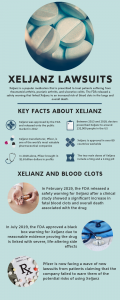A mass tort that has been getting a lot of attention from lawyers around the country in recent weeks is Xeljanz blood clot lawsuits.
Xeljanz now has a boxed warning, the FDA’s most severe safety warning, for DVT and pulmonary embolisms.
These conditions can be fatal. This is a big deal for Pfizer’s blockbuster drug.
The litigation is very new. Our firm is now investigating these Xeljanz blood claims. If you have a potential Zeljanz claim anywhere in the United States, reach out to us and we can tell you what your options are.
UPDATE:
November 9, 2023:
Xeljanz Acne Risk
A new study has revealed that Xeljanz and similar drugs used to treat inflammation and autoimmune conditions, such as ulcerative colitis and rheumatoid arthritis, may heighten the risk of developing acne. The research, conducted by Harvard scientists and published in the Journal of the American Medical Association Dermatology, discovered that patients taking Janus Kinase (JAK) inhibitors, which include popular medications like Xeljanz and Rinvoq, were four times more likely to experience acne compared to those not using these drugs.
The authors of the study cautioned that further research is required to fully understand the acne risks connected to these drugs and the underlying mechanisms responsible for skin reactions. In light of these findings, the researchers emphasized the importance of adequately informing patients about the potential adverse effects of acne before initiating treatment with JAK inhibitors.
The idea is simply warning about risks which is what most mass tort drug lawsuits are about. That is not to say we expect to see Xeljanz acne lawsuits. But drug makers have a duty to warn of known risks so patients can make the best decision for themselves in consultation with their doctors.
Background
 If you suffer from arthritis or ulcerative colitis, you’re probably already well aware of the medication Xeljanz. Xeljanz is the brand name for the drug Tofacitinib, which is prescribed to patients as an immunosuppressant. The drug is relatively new, being introduced onto the market in 2012, but has surged in popularity because of mass marketing. Xeljanz has often been promoted in commercials and magazine advertisements, leading to thousands of patients using the drug hoping it can provide better relief for their chronic symptoms.
If you suffer from arthritis or ulcerative colitis, you’re probably already well aware of the medication Xeljanz. Xeljanz is the brand name for the drug Tofacitinib, which is prescribed to patients as an immunosuppressant. The drug is relatively new, being introduced onto the market in 2012, but has surged in popularity because of mass marketing. Xeljanz has often been promoted in commercials and magazine advertisements, leading to thousands of patients using the drug hoping it can provide better relief for their chronic symptoms.
To be fair, people who have not had side effects seem to have good outcomes with the drug but all the accounts I have seen. So Pfizer is making money hand over fist and the system is working just like it should, right? Drug companies should make a lot of money when they help people. I’m good with that and you should be, too. In this case, it seems that it worked the way it should, right up to the point where it didn’t.
That point for Xeljanz was February 2019, the FDA released a safety warning about the use of Xeljanz, citing the findings of a clinical trial that showed a significantly increased risk of fatal blood clots and death in patients who were prescribed the highest dose of the drug. According to the trial, there have already been 172 documented cases of blood clots attributed to the medication, with 45 of those cases resulting in death.
This safety warning will invariably lead to hundreds of new lawsuits against Xeljanz’s manufacturer, Pfizer. Again, bless them, Pfizer has been printing money on this drug, making a reported $1.8 billion dollars off the drug in 2018. These lawsuits will probably put a substantial dent in Pfizer’s profits from Xeljanz and cause a huge decrease in the number of future prescriptions as patients turn to safer, more reliable medications. And, while it clearly remains to be seen, the Xeljanz lawsuits may also end up costing Pfizer a fortune.
What Is Xeljanz?
Xeljanz is a drug that’s prescribed to patients primarily to treat rheumatoid arthritis (RA), although it was recently approved for the treatment of psoriatic arthritis (PA), and ulcerative colitis (UC). Xeljanz reduces inflammation in the body by suppressing the patient’s immune system. The medication was initially approved for patients who do not respond well to methotrexate, another common immunosuppressant used for arthritis.
Between 2013 and 2018, it was estimated that 132,000 Americans were prescribed Xeljanz to treat rheumatoid arthritis. The average dosage of Xeljanz ranges from 5 to 10 mg in a single pill. The highest dose of Xeljanz, a 10mg pill taken twice a day, was only approved for patients with severe UC. Despite this, doctors have often prescribed this dose for patients with moderate to severe RA, apparently putting thousands of people at an unnecessary risk for adverse effects.
Fatal Blood Clots Linked to Xeljanz
When Xeljanz was first approved for the public market, the FDA required a clinical trial to study the risk of heart-related events, cancer, and opportunistic infections in both the 5 mg and 10 mg doses. The subjects in the trial were at least 50 years old and had at least one cardiovascular risk factor. While the trial is still ongoing, by February 2019, researchers had already found potentially life-threatening side-effects attributed to Xeljanz.
People taking 10mg of Xeljanz twice daily were shown to be at a significantly increased risk of pulmonary embolism (PE), deep-vein thrombosis (DVT), and overall death. In Pfizer’s official press release, the company stated that the study had found that patients taking this dose for RA had a “statistically and clinically important difference” in the percentage of PE and death compared to patients using only 5 mg of Xeljanz. PE and DVT are blood clots that usually develop in the legs. These blood clots eventually break off and become wedged into an artery in the lungs, blocking the passage of blood and oxygen. Without immediate medical intervention, these blood clots can be fatal.
The results from the trial were not without precedent, as there was already a growing number of reports of PE and DVT from the FDA Adverse Event Reporting System (FAERS). Pfizer has denied the connection saying there were no other studies confirming these claims. Now that the new FDA warning has been released, Pfizer has agreed to start transitioning patients to a lower dose.
Xeljanz Lawsuits
It’s expected that the new safety warning will lead to a drastic increase in Xeljanz-related lawsuits. One of the most critical components of these lawsuits is the fact that the drug’s label originally did not include blood clots as a potential side-effect. That warning was only added after the FDA required it in July 2019. This can potentially constitute a “failure to warn” case, meaning Pfizer did not provide a clear warning or set of instructions for the proper use of their medication. To prove this claim, it must be established that Pfizer was aware that the product was dangerous but allowed it to be sold and purchased, and the lack of warning directly led to a person’s injury.
There will be other claims. But the core of this litigation will be a failure to warn. This means that the cases lawyers are likely to take are those that happen before the label was changed. This hurts future victims but will make a settlement of these lawsuits more palatable for Pfizer. Why? Because there is an end date to the lawsuits. If Pfizer had not changed the warning, it would be much harder to convince them to consider a reasonable out-of-court resolution to the case. With an appropriately strong warning now on the label – it does not get any stronger – Pfizer can settle these Xelijanz cases while still defending the product it is currently selling.
It goes without saying that not all Xeljanz prescriptions or side-effects will cause Pfizer to be held liable. Potential plaintiffs will probably need to show:
- that they were being treated for arthritis with Xeljanz,
- they were prescribed a 10 mg twice daily dosage, and
- they suffered from PE, DVT, or a similar blood clot injury.
You or your lawyer will need to obtain your medical documents to flush this out. I’m telling you that I believe you need an experienced attorney to determine if you meet the criteria and to advance the ball for you if you do. After you meet the criteria, your attorney can help you make an informed decision on what steps you should take.
Should you keep taking Xeljanz? That is a question for a doctor, not a lawyer. You should go to your doctor. I can tell you that if you’re currently taking 10 mg of Xeljanz, the FDA recommends that you do not stop taking the medication without first consulting with your health care professional. Stopping the medication suddenly without weaning down the dosage can worsen your condition. If you experience difficulty breathing, chest pain, excessive sweating, or start coughing up blood, these can be symptoms of a blood clot and seek medical attention immediately.
We Are Accepting New Xeljanz Cases
Our firm is currently interested in taking new Xeljanz injury cases. Potential plaintiffs include anyone who was taking the higher dose of Xeljanz (10 mg twice a day) and suffered a blood clot or related type of event while on the medication. You can reach us online.
 Maryland Injury Law Center
Maryland Injury Law Center


